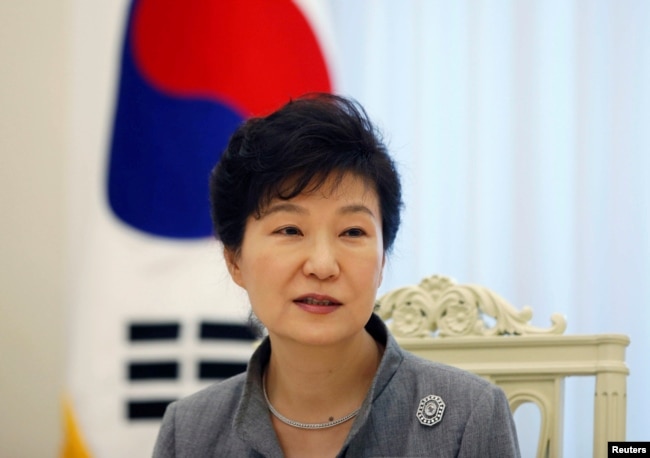In a historic ruling Friday March 10,2017, South Korea's Constitutional Court formally removed impeached President Park Geun-hye from office over a corruption scandal that has plunged the country into political turmoil, worsened an already-serious national divide and led to calls for sweeping reforms.
It was a stunning fall for Park, the daughter of a dictator who rode a lingering conservative nostalgia for her father to a big win in 2012, only to see her presidency descend into scandal.
All 8 of the Constitutional Court justices endorsed the National
Assembly motion, passed in December with more than the two-thirds
majority support needed, to remove Park from office on charges of
corruption, misconduct and negligence.
The unanimous ruling opens her up to possible criminal proceedings, and makes her South Korea's first democratically elected leader to be removed early from office since democracy came in the country in the late 1980s.
The court cited as “grave violations” of the constitution the
allegations that Park colluded with her long-time friend Choi Soon-sil
to extort Korean conglomerates to donate more than $69 million to two
dubious foundations. Choi was alleged to have a “cult-like” influence
over Park and control over her staff, even though she had no official
government role.“These violations undermine the rule law and a representative democracy,” Lee said.
Park was also reprimanded for being uncooperative and evasive in the investigations, and attempting to prevent the legislature from acting as a “check and balance” on executive power.
Other charges the justices found troubling but did not constitute grave violations of the constitution include allegations of negligence related to Park’s extended absence during the 2014 Sewol Ferry disaster.
South Korean acting Constitutional Court's Chief Judge Lee Jung-mi (center) and seven judges during final ruling of President Park Geun-hye's impeachment at the Constitutional Court in Seoul, South Korea, March 10, 2017
South Korea must now hold an election within two months to choose Park's successor. Liberal Moon Jae-in, who lost to Park in the 2012 election, currently enjoys a comfortable lead in opinion surveys. Whoever becomes the next leader will take over a country facing a hostile North Korea, a stagnant economy and deep social and political divides.
Pre-verdict surveys showed that 70 to 80 percent of South Koreans had wanted the court to approve Park's impeachment. But there have been worries that Park's ouster would further polarize the country and cause violence between her supporters and opponents.
Park's parliamentary impeachment in December 2016 came after weeks of Saturday rallies that drew millions who wanted her resignation. Overwhelmed by the biggest rallies in decades, the voices of Park supporters were largely ignored. But they've recently regrouped and staged fierce pro-Park rallies since.
People on both sides have threatened not to accept a Constitutional Court decision that they disagree with. One of Park's lawyers told the court last month that there will be "a rebellion and blood will drench the asphalt" if Park is booted from office. Many participants at anti-Park rallies had said they would stage a "revolution" if the court rejected Park's impeachment.
"If Park accepts the ruling and soothes those who opposed her impeachment, things will be quiet," said Yoon Tae-Ryong, a political scientist at Seoul's Konkuk University. "But looking at what she's done so far, I think that might be wishful thinking."
Others disagreed, saying violent protests won't be supported by the general public
Note
The 64-year-old Park now becomes the first democratically elected
president of South Korea to be removed from office.

She is the second
president to go through the impeachment process. In 2004 President Roh
Moo-hyun was ousted by the legislature but was reinstated by the court
two month later



No comments:
Post a Comment